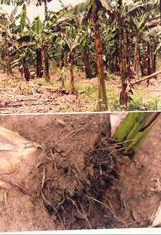
A £7 million research fund is to tackle some of the most damaging and widespread pests, diseases and harsh environmental conditions in the developing world.
The Biotechnology and Biological Sciences Research Council (BBSRC) and the Department for International Development (DFID) are unveiling 12 new projects as part of their flagship initiative - Sustainable Agriculture Research for International Development (SARID).
The projects will use the UK’s bioscience research base to address the challenges of food security in developing countries.
They will look at how a variety of crops - from maize and rice to bananas and coconuts - respond at a molecular level to hostile factors, including pests and diseases, as well as inclement conditions.
The findings are expected to bring about new opportunities to develop crops better able to survive in their changing environments.
Three quarters of people in developing countries live in rural areas, and most depend on agriculture for their livelihoods.
Gareth Thomas, parliamentary under secretary of state for international development and business, enterprise and regulatory reform, said: “Investing in science and research is essential to provide poor farmers with the seeds, knowledge and tools they need to make a better life for themselves. This research, bringing together UK, African and Asian scientists, has the potential to revolutionise farming in the developing world and reduce global poverty. The UK is delighted to support this initiative.”
BBSRC interim chief executive Steve Visscher added: “Bioscience research can make a vital contribution to improving sustainable agriculture across the globe.
These projects will build on the world-leading research on fundamental plant science and plant disease in the UK, and apply this to crops of importance in the developing world, increasing yields and helping to alleviate the suffering of millions living in poverty."
All the projects unveiled involve partnerships between UK scientists and researchers from institutions in Africa, Asia and elsewhere.



